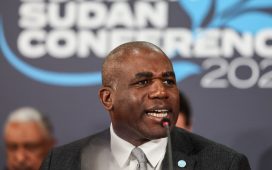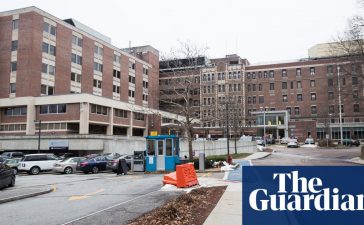Junior doctors may keep striking for another year in their bitter pay dispute with the government, despite NHS leaders’ growing alarm about how the industrial action is disrupting patient care.
Trainee medics in England could even hold a week-long stoppage to escalate their campaign of industrial action to secure a 35% pay rise from the health secretary, Steve Barclay.
The prospect of prolonged and intensified stoppages by England’s 61,000 junior doctors comes as the NHS prepares for four days of hospitals being severely stretched by a strike that starts at 7am on Tuesday and will have the biggest impact of any strike in the service’s 75-year history.
The enforced cancellation of up to 350,000 outpatient appointments and operations has led to a plea from hospital bosses for the conciliation service Acas to get involved to try to broker a deal to end the dispute, amid fears that patients will be put at risk as a direct result of the strike.
Barclay and the British Medical Association (BMA) are at loggerheads over junior doctors’ demand for a pay rise of 35% to act as “full pay restoration” for the 26.2% loss in real-terms income they have experienced since 2008.
Junior doctors are also disillusioned at the increasing inability of the overstretched health service, which has more than 130,000 staff vacancies, to provide fast and high-quality care to people in a medical emergency, for example at A&E or after calling 999.
Sources at the BMA, the main doctors’ union, told the Guardian that junior doctors’ leaders were considering ramping up their industrial action to try to force the government to negotiate.
“If there’s no movement, we’re looking at months and months of action. This could go all the way through to the next general election,” said one senior BMA source.
A second BMA official said: “Escalation could be on the cards. There is enough motivation and resources for junior doctors to keep going for another year.”
A third source at the union added: “The next set of strikes could be longer ones if Barclay doesn’t move. He has to be pressured to start making offers. I’m sure the juniors have got a five-day strike on their minds.”
In deciding on their next steps, leaders of the BMA’s junior doctors committee (JDC) will have to weigh up how willing the medics they represent will be to lose five days’ pay if they do decide to call a strike lasting that long. Junior doctors held a three-day stoppage last month.
The JDC will also have to take into account the readiness of their consultant colleagues – senior doctors – to cover for the juniors, including on overnight shifts, while they are refusing to work.
The JDC has indicated its willingness to lower its 35% claim. It twice last week asked Barclay to make junior doctors “a credible offer” that would allow the JDC to call off this week’s action and start talks.
However, the health secretary maintains that the 35% is a precondition to talks taking place that he is not prepared to meet – a claim the BMA disputes.
after newsletter promotion
Matthew Taylor, the chief executive of the NHS Confederation, suggested that Acas get involved to try to break the deadlock between Barclay and the BMA.
The conciliation service could “provide some basis for negotiations, because – if anything – the position seems to have hardened over the last couple of days”.
He also urged the public to avoid “risky behaviour” this week, to try to minimise the burden on hospitals that will be under even more strain than usual with their junior doctors absent.
“It’s going to be an incredibly tough week,” Taylor said.
“We’ve got four days of industrial action which, of course, come after the Easter bank holiday weekend, followed by another weekend, so you’re talking about 10 or 11 days when the NHS is not able to operate at full strength.”
This week’s stoppage would have a “catastrophic impact” on the health service’s efforts to tackle the 7.2 million-strong backlog of patients waiting for hospital care, Taylor added.











